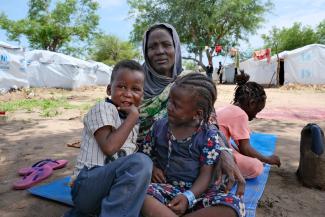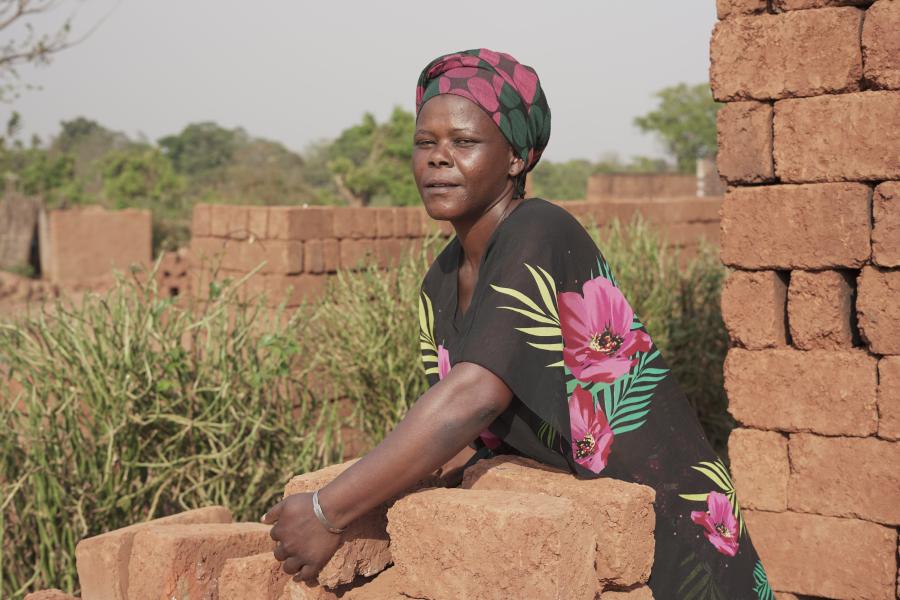2023 situation overview
By the end of 2023, 1.3 million people had been forced to leave their homes in the Central African Republic (CAR). 534,800 were displaced within the country, while 750,800 had sought safety and protection in Cameroon (354,100), the Democratic Republic of the Congo (212,200), Chad (130,000), the Republic of the Congo (33,600), Sudan (18,300), and South Sudan (2,500). Despite years of concerted government and international efforts to restore peace, stability and security, the complex sociopolitical and security situation, characterized by renewed hostilities between armed groups and a worsening humanitarian situation, particularly in rural areas, remained the main drivers of displacement.
The dire economic situation was exacerbated by disruptions in the global supply chain and increases in fuel prices, placing additional strain on vulnerable communities, including forcibly displaced people and their hosts. While a large portion of the population were in need of assistance in 2023, humanitarian access was hampered by the precarious security situation in certain areas, and resources had to be redirected to aid refugees fleeing the crisis in Sudan, and about 30,000 newly arrived Chadians.
Finding solutions for displaced Central Africans remained a high priority for UNHCR in the region, following the 2022 Yaoundé Declaration on “Solutions in the context of forced displacement related to the Central African Republic crisis”. The launch of the CAR Solutions Support Platform in November 2023 marked a significant step in implementing the recommendations of the Declaration. The Platform’s Core Group, led by the African Development Bank, will mobilize financial and technical support, and a regional roadmap was developed to guide programmatic areas. The signatory countries of the Declaration developed national action plans committing to enhancing access to rights, improving social services in areas of return, and promoting employment, with the aim to create an enabling environment for the sustainable refugees' return and their reintegration between 2024 and 2027.
In 2023, UNHCR facilitated voluntary returns to certain areas of the country where the security situation had improved. As the overall conditions in the CAR remained challenging for safe and sustainable returns, UNHCR focused on monitoring situations and providing accurate information on areas of return, to ensure refugees could take informed decisions. With UNHCR’s support, around 4,174 refugees were repatriated to the CAR, primarily from the Democratic Republic of the Congo and Cameroon, bringing the total number of Central African returnees close to 36,700 since 2017.
In addition, around 10,300 Central Africans returned from Sudan due to the crisis there, and from Chad due to the prevailing conditions in certain areas. UNHCR provided around $751,000 in cash assistance to 5,420 returnees, including 1,246 who returned due to adverse circumstances in their country of asylum, to cover travel expenses and immediate needs upon their arrival in the CAR.
Resettlement continued to represent an important means to achieve solutions for refugees. In 2023, 1,528 Central African refugees were resettled, compared to 1,293 in 2022. Most of those who were resettled had sought asylum in Cameroon or Chad.
In response to the IDP situation, UNHCR maintained its leadership role in the Protection Cluster and in the joint Camp Coordination and Camp Management and Shelter Clusters. This included assisting over 16,000 IDPs by building and maintaining shelters and providing shelter kits. Additionally, about 13,000 IDPs (2,600 households) received cash assistance for shelter purposes. An estimated 343,500 internally displaced people were also able to return to their places of origin. Given that the Central African Republic is a pilot country for the UN Secretary General’s Action Agenda on internal displacement, UNHCR strengthened its collaboration with the Resident Coordinator’s office, the UN country team, the Ministry of Humanitarian Action and other stakeholders in implementing the Action Agenda. Engagement focused on supporting the Government’s leadership in the search for durable solutions.
Protection remained at the heart of UNHCR’s response. Gender-based violence emerged as a prominent concern during protection monitoring conducted by UNHCR and its partners in 2023. As part of its response to gender-based violence, UNHCR supported the activities of 25 Safe Spaces, along with a free helpline in Bangui through the Ma Mbi Si Project. These centres, managed by UNHCR's partners, documented 6,462 survivors of gender-based violence in 2023, all of whom received psychosocial support. Financial assistance was provided to cover transport and medical expenses to 1,295 survivors, while 2,249 dignity kits and 778 hygiene kits were distributed.
UNHCR ensured the incorporation of the perspectives of those it serves at all stages of programming in adherence with its commitment to accountability to affected populations. Participatory assessments using UNHCR’s age, gender and diversity approach were conducted in refugee and IDP areas. Community structures and protection committees were established or revamped, with training conducted at IDP sites and refugee villages.
In the six neighbouring countries hosting Central African refugees, UNHCR’s priorities remained the delivery of protection services, with an emphasis on access to documentation, access to livelihood opportunities and socioeconomic integration.
In Cameroon, which hosted almost half of all Central African refugees, UNHCR focused on integrating refugees into national systems and strengthening the link between humanitarian and development activities. Collaboration with development partners helped to facilitate the identification of refugees for livelihood projects that promote empowerment and self-sufficiency. UNHCR’s engagement with the Government of Cameroon ensured the inclusion of refugees in universal health coverage, benefiting 47,100 refugees, of which 26,900 were Central Africans. UNHCR also signed a Memorandum of Understanding with Cameroon’s Central Bureau of Census and Population Studies to incorporate refugees into the upcoming general population and housing census. This will help to identify refugees and will provide crucial data to enhance refugees’ socioeconomic integration.
In the Democratic Republic of the Congo, which hosted more than one in four Central African refugees, UNHCR ensured systematic delivery of identity cards granting refugees freedom of movement and access to assistance. Additionally, over 1,800 birth certificates were issued in four camps and four development centres to Central African refugees. To enhance self-reliance and active economic participation in the local community, UNHCR worked to facilitate refugee access to arable land and other resources, such as watercourses for fishing. About 200 refugees and 40 members of the host community also received training, tools and supplies to support their agricultural activities.
In Chad, which hosted almost one in five Central African refugees, UNHCR worked closely with the Government to protect and assist refugees, including Central Africans. Ensuring access to safe and quality education was a priority, and UNHCR supported the authorities in the implementation of the Government-endorsed UNHCR 2030 education strategy for the inclusion of refugee children in the national system. In 2023, over 21,400 Central African refugee children were enrolled in school, including 19,500 in settlements in the south. UNHCR and its partners supported the training of 175 teachers and provided salaries for 518 in southern Chad.
Financial overview
More contributions information on previous years: Funding Update 2022 | Funding Update 2021
In the Central African Republic, Sudanese refugees start new lives alongside host communities
By Josselin Brémaud and Xavier Bourgois in Birao, Central African Republic
After fleeing Sudan’s conflict, refugees are finding shelter, support, and safety in Korsi, a new neighbourhood in the northern city of Birao.
Read the story

